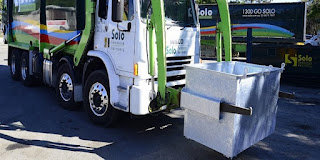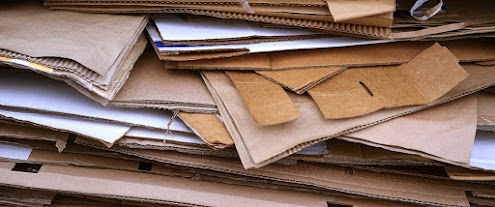Recycling solutions for e-waste, Cardboard, and Other Materials to Protect the Environment, and Safeguard Your Business from Legal Ramifications
Faster electronic product upgrades cause users to abandon their old electronic items, adding to the e-waste solid waste stream. A vast amount of e-waste is abandoned as waste by households, industries, and businesses and is simply thrown away in a landfill. Because of the availability of harmful and toxic elements that can seep into the soil, damage the waterways, and pollute the environment, e-waste can be hazardous if improperly disposed of.
Incineration, illegal dumping of e-waste, and
landfilling all contribute to toxic chemicals in the environment, that pose a
great threat to the health of humans, wildlife, marine life, and local ecology.
As a result, it is critical to dispose of electronic
waste in a responsible and legal manner. The Adelaide Waste and Recycling
Centre regards e-waste as a rich supply of valuable raw materials because all
electronic waste contains recyclable materials such as plastic, glass, metals,
lead, gold, cadmium, PCBs, and so on. Simply because your equipment has reached
the end of its useful life does not mean that the materials contained within it
cannot be reused. Plastic, gold, aluminium, cadmium, and other metals can be
extracted from discarded electronics and utilised to create new products.
E-waste recycling in Adelaide provided by Adelaide Waste
and Recycling Centre covers a range of items including:
- Mobile
phones
- Laptops
- Monitors
- Televisions
- Microwaves
- Battery
cells
- iPods
- Electrical
and electronic toys
- Scanners
- Printers
- Cathode
ray tubes (CRTs)
- Cables
·
Fax
machines, and more
In addition, the company offers e-waste recycling
solutions for larger equipment such as dishwashing machines, washing machines,
electric stoves, solar panels, heat pumps, refrigerators, air conditioners, and
more. After automatic and human sorting, the mixed e-waste is delivered to
specialised recyclers at the company's e-waste recycling facility in Adelaide.
Some garbage may be manually deconstructed and then shredded into small bits at
this point to ensure precise material shorting.
Processing of e-waste
Mechanical separation, magnetic separation, and water
separation may be required for some e-waste. Magnetic separation involves
passing e-waste via a massive magnet that can separate ferrous metals such as
iron and steel from the e-waste mix, which may then be routed to specialised
recycling operations for smelting. The company's e-waste recycling in Adelaide may use the water separation process
to remove non-ferrous materials such as plastic and glass. At the e-waste
recycling in Adelaide, batteries are classified by chemistry, such as
lead-acid, nickel-cadmium, lithium-ion, and so on, and then put through the
proper e-waste in Adelaide recycling processes.
Cardboard recycling
Adelaide cardboard recycling, on the other hand,
requires entirely distinct procedures. It entails recycling and reusing
discarded thick sheets or stiff multilayered papers. Adelaide cardboard
recycling is done at the company's recycling facility in an environmentally
friendly manner. When corrugated boards arrive at the company's Adelaide
cardboard recycling facility, they are categorised according to the material
utilised, such as thin boxboards and stronger corrugated boards. After sorting,
the next process is shredding, followed by pulping. To solidify the pulp, it is
mixed with wood chips or new pulp.
The pulp is filtered to eliminate all foreign
contaminants such as plastics and metal staples using a centrifuge-like
technique. The following step is de-inking, which cleans the pulp and prepares
it for the next processing. The cleansed pulp is combined with new
manufacturing materials. Excess water is pushed out, and then long rolls of
solid sheets are made to form linerboards, which are subsequently attached
layer by layer to create the new piece. Linerboards can be sent to boxboard
factories, where Adelaide cardboard recycling is finished by using machinery to form boxes for packaging or
shipping things.
Take advantage of regularly
scheduled industrial waste collection arrangements.
Adelaide Waste and Recycling Centre also offers
industrial waste bins in a variety of sizes, ranging from 1 cubic metre to 4.5
cubic metres, 1100 litres, and big multi-lift bins. Adelaide Waste and
Recycling Centre's creative waste management solutions for green waste, organic
waste, tyre disposal, e-waste recycling, and cardboard recycling will keep your
business in compliance with all Adelaide waste legislation. You will benefit
from regularly scheduled industrial waste collection plans that will help your
firm save money and avoid legal difficulties caused by improper disposal and
environmentally friendly methods.
Electronic garbage, batteries, mobile phones,
cardboard and paper, textiles, wearable clothes, aluminium cans, whitegoods and
appliances, glass bottles and jars, and other waste are all accepted at the
Adelaide rubbish dump. The Adelaide Waste and Recycling Centre, located in
North Plympton, accepts most commercial and household waste and employs
innovative procedures for e-waste recycling and cardboard recycling in
Adelaide. At the company's e-waste recycling centre in Adelaide, all families
and small businesses can recycle computers and televisions for free. The
company's e-waste recycling facility in Adelaide participates in the National
Television and Computer Recycling Scheme.




Comments
Post a Comment